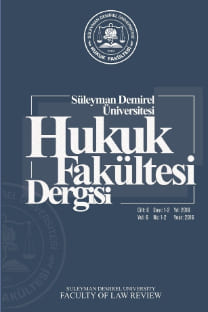REFORMATION IN ISLAMIC LAW; CAN SHARIA DISENTANGLE FROM FIQH?
___
- BIBLIOGRAPHY AN-NA’IM AA, 'Globalization and Jurisprudence: An Islamic Law Perspective' (2005) 54 Emory Law Journal 25–51 Islam and the secular state: Negotiating the future of Shariʻa (Harvard University Press 2008) BASSIOUNI MC and Badr GM, 'The Shari’ah: Sources, Interpretation and Rule-Making' (2002) 135(181) 1 UCLA J. Islamic & Near Eastern L. COULSON NJ, A History of Islamic Law (Edinburgh University Press 1978) HADDAD YY and STOWASSER BF (eds), Islamic law and the challenges of modernity (AltaMira Press 2004) HALLAQ WB, 'What is Sharia?' (2007) 12 Yearbook of Islamic and Middle Eastern Law 151–80 An introduction to Islamic law (3rd edn, Cambridge University Press 2009) SCHACHT J, An introduction to Islamic law (Oxford University Press 1964) ZUBAIDA S, Law and power in the Islamic world
- ISSN: 2146-7129
- Yayın Aralığı: 2
- Başlangıç: 2011
- Yayıncı: SÜLEYMAN DEMİREL ÜNİVERSİTESİ HUKUK FAKÜLTESİ
SORUMSUZLUK ANLAŞMALARINA İLİŞKİN BİR YARGITAY KARARI İNCELEMESİ
İSLAM HUKUKU’NDA HUKUKSAL MANTIK VE EQUITY
REFORMATION IN ISLAMIC LAW; CAN SHARIA DISENTANGLE FROM FIQH?
İNSAN HAKLARI HUKUKUNDA ÜÇÜNCÜ KUŞAK HAKLAR
AHMET AKBABA, İNSAN HAKLARI HUKUKUNDA ÜÇÜNCÜ KUŞAK HAKLAR, LEGAL YAYINEVİ, İSTANBUL 2016
SÜLEYMAN DEMİREL ÜNIVERSİTESI ÖĞRENCİLERİNİN HÜKÜMET SİSTEMLERİ KARŞISINDA TUTUM VE DAVRANIŞLARI
